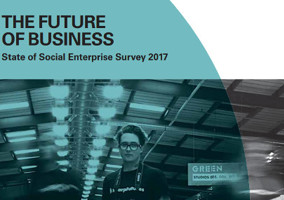Social enterprises are outperforming traditional businesses and doing more to tackle the “triple threat of economic stagnation, social division and environmental meltdown,” according to a new report by Social Enterprise UK.
The report, entitled Capitalism in Crisis? Transforming our economy for people and planet, is the latest edition of its biennial State of Social Enterprise Report.
Speaking about the report, Peter Holbrook, chief executive of SEUK, said that social enterprise offers a better model of doing business than traditional capitalism, and that those that defend “business as usual” are “not friends of capitalism, they are killing it.”
He said: “With 11 years to avert climate disaster, a faltering economy and an ever more divided society – there can be no doubt that capitalism is facing crisis. The answer is not to junk capitalism, but to reform it so that it is able to meet the scale of the challenges we face.”
More than half of social enterprises have grown
The report says that 52 per cent of social enterprises grew their turnover in the past 12 months. This compares with 34 per cent of SMEs. Over the same period, 56 per cent of social enterprises launched a new product or service while 36 per cent of SMEs did so.
Over three quarters, 77 per cent of social enterprises, earn more than 75 per cent of their income through trading, it states. In addition, 48 per cent of social enterprises made a profit in the last year, with 27 per cent breaking even and a lower percentage losing money than in previous research.
More social enterprises are looking to employ additional people in the year ahead than SMEs. Around half, 49 per cent, of social enterprises said they planned to do so, compared with 25 per cent of SMEs.
Social justice
In terms of social justice, 40 per cent of social enterprises are led by women, compared to 17 per cent of SMEs and 5 per cent of the FTSE 100, according to SEUK. The report says that 13 per cent of social enterprises are BAME led, while 5 per cent of SMEs and 6 per cent of charities are.
The majority, 73 per cent of social enterprises, work with individuals facing disadvantage such as people with disabilities, the long-term unemployed, people who are homeless, ex-offenders and people facing mental health challenges.
The report also found that 86 per cent of social enterprises actively involve staff in decision making, and 85 per cent recruit over half their staff locally, with 68 per cent saying that they draw their entire workforce from the local area.
Social enterprises are also more environmentally conscious and active, the report claims. It says that 75 per cent of social enterprises view the environment as being equally or more important than cost when it comes to procurement decisions. This is compared to 24 per cent of SME owners.
Most social enterprises, 88 per cent, actively aim to minimise their environmental impact. This is set to increase as 65 per cent said they expect the focus on sustainable and environmentally friendly processes within their organisation to increase in the next two to three years. This compares with 49 per cent of SMEs.
SEUK surveyed 1,068 social enterprises on the telephone and online. It uses the UK government’s Small Business Survey 2018 for SME comparisons.
|
Related articles












